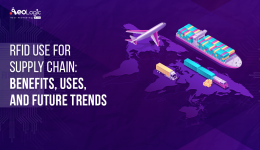An introductory understanding of blockchain technology would help us understand how it can be useful for associations to partake data with partners to ameliorate effectiveness. In this blog, we will discuss how blockchain technology help businesses share data.
Overview of How Blockchain Technology Help Businesses Share Data
Blockchain technology help businesses share data. Since it is a database of digital transactions participated across a network of computers. Since, there’s no direct commerce with intermediaries, all transactions must be checked and validated through a network of nodes. Similar validated transactions are called blocks and are added to the blockchain.
Also read: The Benefits of Blockchain Technology in Supply Chain
The Significance of Data Participating in Associations
- When data is freely participated within the teams, it helps effective collaboration leading to better decision making.
- Easy access makes the decision making process briskly as the analysis is quick.
- Data operation is more provident as participating reduces the need for multiple data storehouse.
- The fact that everyone has the veritably same empirical information creates a advanced position of trust.
- Since they work with real time information, associations can quickly make the right opinions according to market
Benefits of Using Blockchain Technology For Data Participating
Increased Security
Each block is translated and linked to the immediately preceeding block using complex algorithms, making it nearly insolvable for hackers to tamper with the data. Blockchain technology help businesses share data by increasing the security.
Advanced Translucency
It improves translucency by furnishing a secure, decentralized, and flexible tally.
Enhanced Data Operation
We’ve seen how encryption, access control, and agreement insure the security of inflexible data and how smart contracts exclude the need for intermediaries.
Advanced Traceability
Since blockchain technology creates tamper- proof permanent records at each sale position, it becomes easy to track and trace the responsibility of each party in the blockchain. This leads to higher translucency.
Enforcing Blockchain Technology For Data Participating in Associations
Assessing Organizational Conditions
We have previously seen how smart contracts, inflexible record keeping, and decentralized verification helps associations.
Tokenization can help represent organizational conditions as digital means on a blockchain. This makes the evaluation process more secure and transparent.
Integration With Present Systems
- First, identify the systems that need to be integrated.
- Determine why you want to incorporate blockchain technology with your data.
- Choose the right blockchain platform to suit your purpose.
- Decide the type of network.
- Remember, that only a specific group of people can pierce private networks.
- Develop the right kind of smart contract.
- Choose the applicable middleware and other factors to integrate the present system with the blockchain.
- Test and also emplace the integration in a typical product terrain.
- Examine and maintain all that’s demanded for the integration.
Training and Support For Users
To produce decentralized training platforms and support systems to give tailored training experiences to users. Blockchain can issue and corroborate instruments and credentials to users who complete the training successfully. Blockchain can help develop learning operation systems where users can keep track of their progress and their achievements in a secure, decentralized, and transparent manner.
Ongoing Conservation and Upgrades
Smart contracts can take care of conservation and upgrade functions. Smart contracts on a blockchain network run decentralized autonomous associations (DAOs). When members authorize an offer for conservation or upgrade, the smart contract will take over and apply it.
Case Studies and Real World Operations
Use of Blockchain in Healthcare
- Blockchain technology helps produce secure and tamperproof Electronic Health Records (EHRs).
- Researchers, controllers, and participants will have access to a secure and transparent tally of all trials- data.
- One can track every step of the movement of a medicine from the manufacturer to the patient.
- Likewise, it’s easy to follow the entire supply chain of medical inventories from manufacturers to the hospital.
- Medical labor supply can treat cases who live in remote areas by penetrating the health records of cases.
Use of Blockchain in Supply Chain Operation
We have seen how blockchain can track the movement and authenticity of goods. This also improves collaboration between the different parties in the supply chain to coordinate each other’s conditioning and optimize logistics.
Use of Blockchain in Banking and Finance
- One can insure speedy and secure fund transfers through blockchain.
- You can store client’s particular information in a safe, fluently retrievable manner.
- These can be automatically executed when the asked conditions are met.
- The capital market can insure the transfer of means in real- time transparently and securely.
Use of Blockchain in Government and Public Services
Blockchain helps the government and public services by furnishing a decentralized and secure identity system where people can control and authenticate their data. It can come in handy to produce voting systems, maintain land registry databases, public healthcare systems, and public finances.
The Future of Blockchain Technology For Data Participating
The Implementation of Decentralized Systems
Hybrid performances of blockchain would crop with the benefits of public and private blockchains to give customizable results. Integration with arising technologies like artificial intelligence and Internet of things (IoT) will probably be. Presently, the high energy consumption of blockchain networks poses enterprises, but new mechanisms like proof of stake (PoS) give an energy-effective volition to the proof of work (PoW) medium.
Decentralized finance (DeFi) has formerly begun to disrupt traditional finance. Numerous further DeFi operations are in the offing to give further financial freedom and security.
The Impact on Data Privacy and Control
Some worry that blockchain technology can potentially impact data privacy and control. Presently, a centralized database run by third parties stores particular information. Blockchain technology can enable individualities to store their data in a decentralized fashion with defined access.
The Role of Interoperability
Blockchain will come the byword for interoperability. Organizations will bear the technology for shifting means and data across multiple platforms. In supply chain operation, it’ll help track products across different networks. DeFi platforms will help associations interact with each other indeed as data privacy and security information is participated across different blockchains.
Also read: Impact of Blockchain Technology on Healthcare Sector
Conclusion
The ever growing use of blockchain technology is clearly helping associations partake data.
Get in touch with us to know more about blockchain technology.







